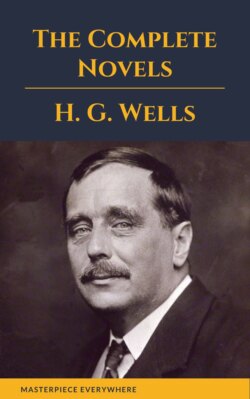Читать книгу H. G. Wells : The Complete Novels - H. G. Wells - Страница 32
На сайте Литреса книга снята с продажи.
7.
ОглавлениеThere were moments during that wonderful night when it seemed to Bensington that he was planned by nature for a life of fantastic adventure. This was particularly the case for an hour or so after he had taken a stiff whisky. “Shan’t go back to Sloane Street,” he confided to the tall, fair, dirty engineer.
“You won’t, eh?”
“No fear,” said Bensington, nodding darkly.
The exertion of dragging the seven dead rats to the funeral pyre by the nettle grove left him bathed in perspiration, and Cossar pointed out the obvious physical reaction of whisky to save him from the otherwise inevitable chill. There was a sort of brigand’s supper in the old bricked kitchen, with the row of dead rats lying in the moonlight against the hen-runs outside, and after thirty minutes or so of rest, Cossar roused them all to the labours that were still to do. “Obviously,” as he said, they had to “wipe the place out. No litter— no scandal. See?” He stirred them up to the idea of making destruction complete. They smashed and splintered every fragment of wood in the house; they built trails of chopped wood wherever big vegetation was springing; they made a pyre for the rat bodies and soaked them in paraffin.
Bensington worked like a conscientious navvy. He had a sort of climax of exhilaration and energy towards two o’clock. When in the work of destruction he wielded an axe the bravest fled his neighbourhood. Afterwards he was a little sobered by the temporary loss of his spectacles, which were found for him at last in his side coat-pocket.
Men went to and fro about him— grimy, energetic men. Cossar moved amongst them like a god.
Bensington drank that delight of human fellowship that comes to happy armies, to sturdy expeditions— never to those who live the life of the sober citizen in cities. After Cossar had taken his axe away and set him to carry wood he went to and fro, saying they were all “good fellows.” He kept on— long after he was aware of fatigue.
At last all was ready, and the broaching of the paraffin began. The moon, robbed now of all its meagre night retinue of stars, shone high above the dawn.
“Burn everything,” said Cossar, going to and fro— “burn the ground and make a clean sweep of it. See?”
Bensington became aware of him, looking now very gaunt and horrible in the pale beginnings of the daylight, hurrying past with his lower jaw projected and a flaring torch of touchwood in his hand.
“Come away!” said some one, pulling Bensington’s arm.
The still dawn— no birds were singing there— was suddenly full of a tumultuous crackling; a little dull red flame ran about the base of the pyre, changed to blue upon the ground, and set out to clamber, leaf by leaf, up the stem of a giant nettle. A singing sound mingled with the crackling… .
They snatched their guns from the corner of the Skinners’ living-room, and then every one was running. Cossar came after them with heavy strides… .
Then they were standing looking back at the Experimental Farm. It was boiling up; the smoke and flames poured out like a crowd in a panic, from doors and windows and from a thousand cracks and crevices in the roof. Trust Cossar to build a fire! A great column of smoke, shot with blood-red tongues and darting flashes, rushed up into the sky. It was like some huge giant suddenly standing up, straining upward and abruptly spreading his great arms out across the sky. It cast the night back upon them, utterly hiding and obliterating the incandescence of the sun that rose behind it. All Hickleybrow was soon aware of that stupendous pillar of smoke, and came out upon the crest, in various deshabille, to watch them coming.
Behind, like some fantastic fungus, this smoke pillar swayed and fluctuated, up, up, into the sky— making the Downs seem low and all other objects petty, and in the foreground, led by Cossar, the makers of this mischief followed the path, eight little black figures coming wearily, guns shouldered, across the meadow.
As Bensington looked back there came into his jaded brain, and echoed there, a familiar formula. What was it? “You have lit to-day—? You have lit today—?” Then he remembered Latimer’s words: “We have lit this day such a candle in England as no man may ever put out again— ”
What a man Cossar was, to be sure! He admired his back view for a space, and was proud to have held that hat. Proud! Although he was an eminent investigator and Cossar only engaged in applied science.
Suddenly he fell shivering and yawning enormously and wishing he was warmly tucked away in bed in his little flat that looked out upon Sloane Street. (It didn’t do even to think of Cousin Jane.) His legs became cotton strands, his feet lead. He wondered if any one would get them coffee in Hickleybrow. He had never been up all night for three-and-thirty years.
